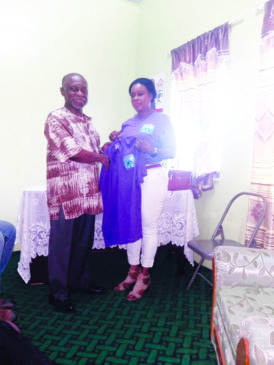 By Lakhram Bhagirat
By Lakhram Bhagirat
The World Health Organisation (WHO) estimates that 1 in every 3 women will experience some form of intimate partner violence in their lifetime. This number is staggering and calls for a comprehensive plan of action in addressing the global epidemic.
However, as conversations surrounding domestic violence roar on, one woman, Camille Cox is using her status as a former victim to reach out and empower other women who are in situations where they are subjected to violence at the hands of their partners.
WHO reports that violence against women is a major public health problem, and global estimates indicate that about 1 in 3 or 35 per cent of women worldwide has experienced either physical and/or sexual intimate partner violence or non-partner sexual violence in their lifetime.
“Globally, as many as 38 per cent of murders of women are committed by a male intimate partner. Violence can negatively affect women’s physical, mental, sexual, and reproductive health, and may increase the risk of acquiring HIV in some settings. There is evidence that advocacy and empowerment counselling interventions, as well as home visitations, are promising in preventing or reducing intimate partner violence against women. Situations of conflict, post-conflict and displacement may exacerbate existing violence, such as by intimate partners, as well as/and non-partner sexual violence, and may also lead to new forms of violence against women,” WHO said in a November 2017 fact sheet.
Knowing these facts, coupled with her experiences, Camille started the Silence Hides Violence Foundation (SHVF) to empower particularly women to become independent. The Foundation not only caters for women it focuses on all victims of abuse and children as well.
Though relatively new in its formation, SHVF has always been a dream for Camille since she wanted to use her experiences as a victim of both physical and sexual violence to help change the world.
Going back to her formative years, Camille grew up in Plaisance on the East Coast of Demerara and has always had a promising future. While a student at the Cummings Lodge Secondary School, she was an athlete. One day when she was training on the seawalls, she was violated.
“I was 16 when I went one afternoon to train on the seawall and I was raped by someone who knows me. Nothing came out of that, because at that time it was taboo to discuss such and to bring it out in the open. I was injured and my legs got broken in the process and that was it. It was never discussed in the family,” she remembers.
“I felt disgusted. I felt worthless because I was a virgin at the time and I processed it and got over all by myself. I didn’t go to any counselling or anything like that and it did affect me until after I got my kids. I used to remember it and cry even when I was in my 30s. I used to rethink and then say I shouldn’t listen to my parents, but now that person is dead,” she added.
At 21, Camille moved to New Amsterdam where she continues to live to date. There, she met the father of her son and although they did not live together, he was a controlling man.
“One day he slapped me and he said he was sorry about it. My eyes were swollen and my parents asked me what happened and I gave the usual excuse: I got stung by a maribunta (wasp) and he was very apologetic and whatever. He took me out and so on, but then he did it again and when he did it again, then was when I said to myself ‘this is it, this is the end of it’.”
It got messy because her child’s father hit her with such force that her mouth was filled with blood. She retaliated by connecting an ashtray to his eyes.
The couple then parted ways and it was then she decided to channel her experiences towards helping those who need it. The idea was there for a while, but it came to fruition in July when she officially launched SHVF.
“Persons are suffering and they are doing it in silence because they have nowhere to turn to. Yes, you have the Help and Shelter and various organisations, but do they listen? Do they help the victim in the aftermath? Do they help the victim?”
“I find most persons after being abused, they have nobody to talk to. Persons need to have someone to listen to them. Some persons just want somebody to listen. We help to gain employment, support for their kids, and that is our goals,” she explained.
Camille intends to continue providing relief to those in need.



